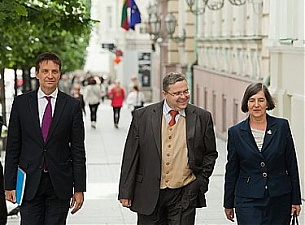Analytics, EU – Baltic States, Financial Services, Legislation, Lithuania, Markets and Companies, Shadow economy
International Internet Magazine. Baltic States news & analytics
Monday, 05.01.2026, 17:46
Baltic central banks: euro introduction does not influence shadow economy
 Print version
Print version |
|---|
| Ardo Hansson, Vitas Vasiliauskas and Zoja Razmusa. Photo: lietuvosbankas.lt |
"I think it is related to national particularities, the euro has nothing in common with it. There is no difference for the shadow economy what currency is used. I would not associate these issues," said Vitas Vasiliauskas, Chair of the Board of the Bank of Lithuania.
Ardo Hansson, the Governor of the Central Bank of Estonia, also sees no means that could affect the extent of the shadow economy during the changeover to the euro.
Meanwhile, Zoja Razmusa, Deputy Governor at Bank of Latvia, has noted some positive signs.
"Banks in Latvia were very active before the introduction of the euro in encouraging business and persons to put their money into accounts to facilitate the changeover. We see that a share of this money has remained in banks," said Razmusa.
Vitas Vasiliauskas says that following the introduction of the euro the general price level should not change much.
"I can only tell that no big changes are forecasted regarding inflation. Annual inflation stands at 0.6 percent, in principle it means that it is very low. If we compared income growth rate to price growth rate, income growth exceeds price growth," said Vasiliauskas.
The governors of the Estonian and Latvian central banks also assured Lithuanians that after the introduction of the euro price change was insignificant in their countries and most often an increase in prices for services was observed.
"Of course, there were fears about inflation during the transition. Afterwards some prices slightly went up, mostly prices in service sectors: hairdressing, restaurants. To sum up, we have carried out a research which revealed that prices most likely increased by 0.2-0.3 percent," said Ardo Hansson, Governor of the Central Bank of Estonia.
On Wednesday, the European Commission and the European Central Bank will publish the Convergence Report, which will serve as a basis for the European Commission when deciding whether to invite Lithuania to join the euro area or not. Lithuania seeks to join the euro area from 2015.








 «The Baltic Course» Is Sold and Stays in Business!
«The Baltic Course» Is Sold and Stays in Business!

